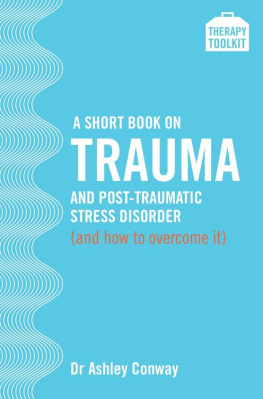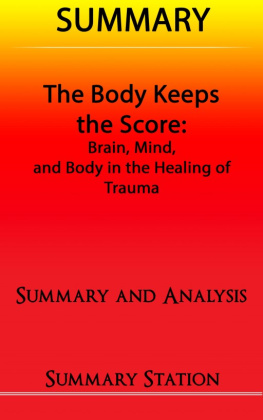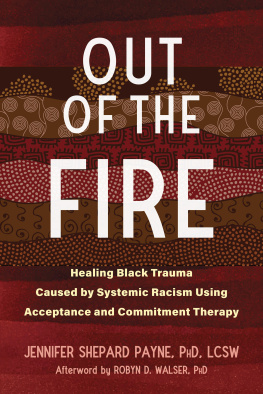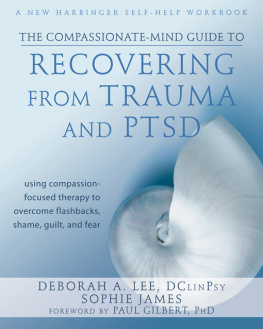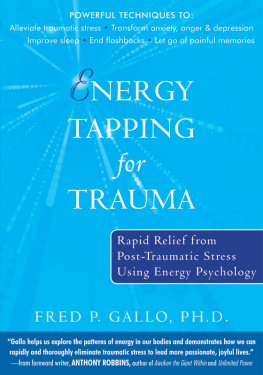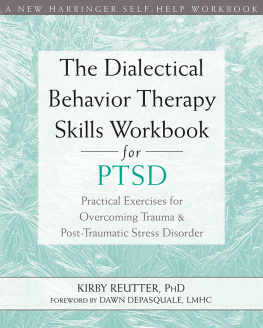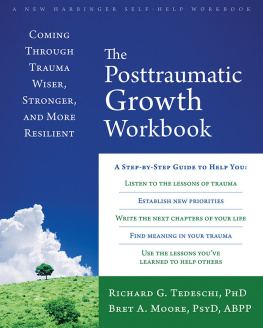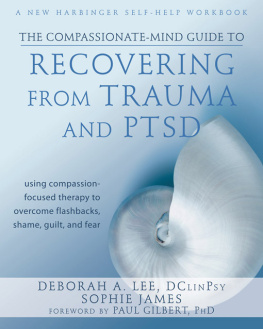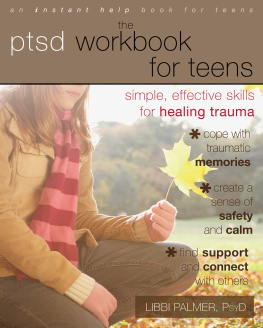S uffering a problem in response to a traumatic experience is much more common than we might think. In the general population about one in twelve people will suffer a traumatic reaction at some time in their lives. Amongst higher-risk individuals (survivors of assault, military combat and captivity, ethnically or politically motivated internment and genocide) the proportion suffering a traumatic reaction may rise to 3050 per cent.
In this Short Book two stories are told. Neither of them is about actual people. Janes story is based on a real-life event that did occur. Roberts is a work of fiction. But both are accurate portrayals of the kind of thing that does happen to real people, and are based on years of experience in dealing with individuals who have lived through traumatic events. This work is dedicated to them, and their courage in facing up to what they have been through, and their willingness to work through it and heal.
If you are reading this because you are suffering a post-trauma reaction, or in order to support a loved one, I wish you well. The path is not always easy, but recovery is achievable. It helps to have understanding and patience. I hope that what you read below helps you along this journey.
F irst of all, we need to establish what constitutes a trauma. This may seem like common sense, and sometimes it is, but often it is not. For mental health professionals it is of course important to have a common language, so for them terms have to be quite specifically defined. Currently the professional definition of trauma is rather narrow: the event must involve actual or threatened death or serious injury to the individual directly, or such an event must be witnessed by the individual. Such a narrow definition is unsurprising; lawyers and other professionals need to have specifically defined terms to determine if certain diagnostic labels are appropriate when litigation is involved.
Jane is a brilliant young woman. Her life seemed blessed. She grew up in a very supportivefamily, and had recently become engaged to a wonderful man, Philip. Her PhD thesis at Oxford examined strategies for introducing elections and voting systems to emerging democracies.
In the first decade of the 21st century Iraq was in turmoil following the downfall of Saddam Hussein. The western powers were desperate for a solution and an exit for themselves and their armed forces. The United Nations had a major presence in Baghdad and needed experts in processes of democracy. Janes boss would have liked to have gone, but he had a growing family and was dissuaded from taking the post. It was only natural for him to recommend Jane for the job. She was thrilled to accept realising that at the tender age of 32 she had an opportunity to play a significant part in making the world a better place. The idea both thrilled and humbled her. Time was short, and within a couple of weeks of her initial conversation, in the early hours of August 19, she was on a flight bound for Baghdad.
Jane had flown many times before, but never like this. There was an odd split in the passengers, almost all of whom were men.Half of them seemed to be over-excited, talking quickly and laughing easily, while the other half sat quietly, mainly staring blankly ahead. Over the PA system the pilot made a cheery comment to hold tight, as they were now beginning their descent into Baghdad airport. Jane looked out of her window . They still seemed very high. Then the aircraft began to drop rapidly, spiralling as it did. Jane did not normally get sick flying, but this made her nauseous. She turned to the quiet man in the seat next to her to get information.
This is Iraq, he said. You cant do a normal landing here. We come in high, then spiral down well land pretty hard.
Why do they do it like that here?
Surface-to-air missiles if we come in on a straight line, we make an easy target. Like this we are hard to hit.
Oh, right.
The passengers went quiet, and following the gut-churning spiral they did indeed land with a bump. Jane was met by a UN official at the airport and they drove in the middle of a three-vehicle convoy to her new workplace. The headquarters of the UN was the former Canal Hotel, half a mile fromthe heavily protected Green Zone in central Baghdad. En route, her colleague had told her that there was a press conference that afternoon, and the boss, Sergio Vieira de Mello, would be making a statement to the worlds press. He hinted that it would be controversial and critical of the way that the Coalition had managed things to date. He told Jane that she was welcome to get stuck in straight away and attend the briefing meeting before, then the press conference. Jane felt so excited, she could hardly believe that she was going to be so involved so quickly. Within an hour of her arrival she had been introduced to more people than she could remember, and found herself sitting at the back of an office crowded with over twenty of the UNs most senior staff in Iraq. The boss was going to give them a briefing about the press conference he would be holding in an hours time. Word of its potentially controversial tone had leaked. Many members of the worlds press were already preparing, and camera crews were setting up around the UN headquarters to compete to be the first to report back the latest news to their home countries.
At 4.00pm precisely, Mr Vieira de Mellobegan his presentation. The dazzling afternoon sunlight was reflecting off the highly polished mahogany of his desk, and Jane shuffled her chair a few inches to her right to avoid the glare. She later found out that there were 23 other people in the room. Nineteen minutes later there were three left alive. Two hours after that it was two, and one of them had had both legs amputated at the site to save his life and get him to hospital. Jane woke in hospital in London nine days later. She had vague memories of lying in a tent a field hospital? Falling, a deafening roar, a TV camera, the whirring of helicopter blades, an American soldier screaming profanities , being led away. There was no order or structure, just a jumble of pieces, as if somebody had made a movie, then cut it up into pieces and joined them together again randomly.
Gradually, however, she was able to put the story together with what she learned from others. A lorry full of explosives had been driven to a spot exactly underneath Mr Vieira de Mellos office, which overhung the service road. The driver had detonated himself and the lorry and caused massive damage to the building. Twenty-two people,including Mr Vieira de Mello, died, and over 150 were injured. Jane was lucky. Because of her junior status, she was sitting at the furthest point from her new boss, against a wall that remained intact. Flying glass caused her main injuries. For reasons that remain unclear, one of the most likely bomb targets in Iraq had ordinary glass in the windows, with no film or other protection to prevent shards flying through the air. Jane was hit by many of these pieces. Some big, some small. A large piece had hit her vertically in the face, causing a massive gash cutting through her left cheek and destroying her eye.
There is not much doubt that Janes experience would constitute a trauma, of the most extreme kind, under any definition. But I believe that the narrow definition of trauma commonly used by mental health professionals is over-simplistic for two reasons: firstly, events can be traumatising without being literally life-threatening , such as being fired after twenty years in a job, a spouse leaving after many years of marriage, or finding out that retirement savings have been stolen by a dishonest investment broker. Secondly, the normally used formal definition of trauma implies an acute specific event. What about somebody who has been held as a prisoner of war for months or years? A child who has grown up with an alcoholic or violent parent? Someone who nurses a loved one through their declining years, or through a terminal and painful illness? I would say that these are also traumatic experiences, producing many of the symptoms and outcomes seen in those affected by a specific traumatic event.

